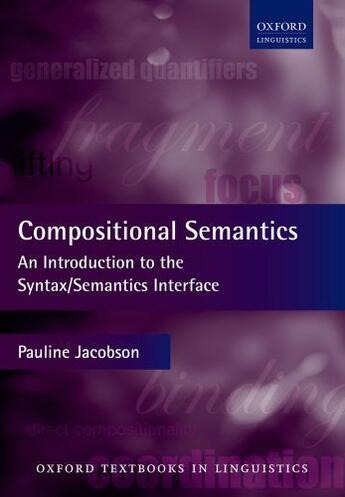-
Nombre de pages : (-)
-
Collection :
(-)
-
Genre :
(-)
-
Thème :
Non attribué
-
Prix littéraire(s) :
(-)
Résumé:
This book provides an introduction to compositional semantics and to the syntax/semantics interface. It is rooted within the tradition of model theoretic semantics, and develops an explicit fragment of both the syntax and semantics of a rich portion of English.
Professor Jacobson adopts a... Voir plus
This book provides an introduction to compositional semantics and to the syntax/semantics interface. It is rooted within the tradition of model theoretic semantics, and develops an explicit fragment of both the syntax and semantics of a rich portion of English.
Professor Jacobson adopts a Direct Compositionality approach, whereby the syntax builds the expressions while the semantics simultaneously assigns each a model-theoretic interpretation. Alongside this approach, the author also presents a competing view that makes use of an intermediate level, Logical Form. She develops parallel treatments of a variety of phenomena from both points of view with detailed comparisons. The book begins with simple and fundamental concepts and gradually builds a more complex fragment, including analyses of more advanced topics such as focus, negative polarity, and a variety of topics centering on pronouns and binding more generally. Exercises are provided throughout, alongside open-ended questions for students to consider. The exercises are interspersed with the text to promote self-discovery of the fundamentals and their applications.
The book provides a rigorous foundation in formal analysis and model theoretic semantics and is suitable for advanced undergraduate and graduate students in linguistics, philosophy of language, and related fields.
Donner votre avis














